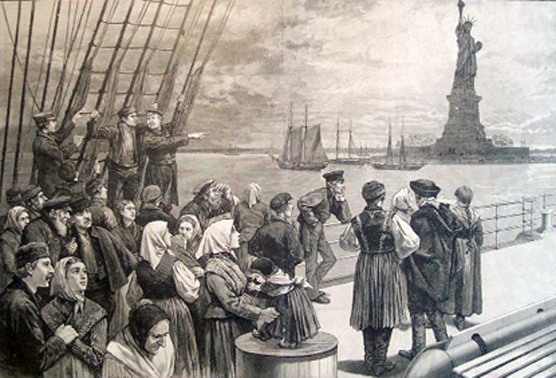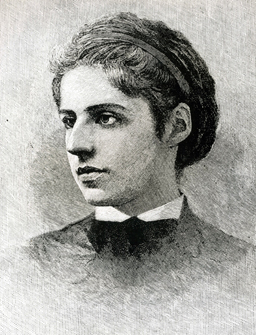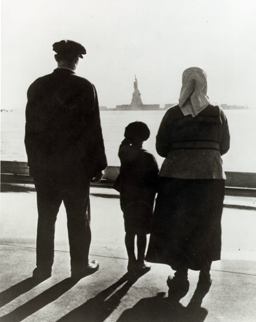
- Goose
- Cogito ergo sum
 Offline
Offline 
- Registered: 1/29/2015
- Posts: 13,427
The Immigrant's Statue
The Immigrant's Statue
An illustration of immigrants on the steerage deck of an ocean steamer passing the Statue of Liberty from Frank Leslie’s Illustrated Newspaper, July 2, 1887. 
Between 1886 and 1924, almost 14 million immigrants entered the United States through New York. The Statue of Liberty was a reassuring sign that they had arrived in the land of their dreams. To these anxious newcomers, the Statue's uplifted torch did not suggest "enlightenment," as her creators intended, but rather, "welcome." Over time, Liberty emerged as the "Mother of Exiles," a symbol of hope to generations of immigrants.
A portrait of Emma Lazarus. 
The opening of the immigrant processing station at Ellis Island in 1892 in the shadow of the Statue of Liberty facilitated an immigrant association, as did the later popularity of Emma Lazarus's poem, "The New Colossus." In 1883, Lazarus donated her poem, "The New Colossus," to an auction raising funds for the construction of the Statue's pedestal. This poem vividly depicted the Statue of Liberty as offering refuge to new immigrants from the miseries of Europe. The poem received little attention at the time, but in 1903 was engraved on a bronze plaque and affixed to the base of the Statue.
A newly arrived immigrant family on Ellis Island, gazing across the bay at the Statue of Liberty. 
War tensions in the twentieth century reinforced this connection and further advanced the image of the Statue in the harbor as an emblem of the United States as a refuge for the poor and persecuted of Europe, and as a place of unlimited opportunity. Sometimes this image glossed over the very real drawbacks and difficulties of settling in the United States, but it was a romantic view that was dominant for decades and continues to persist. In addition to masking immigrant setbacks in the United States, it was a story that tended to favor the European side of immigration at the expense of trials encountered by newcomers from Latin America and Asia.
President Franklin D. Roosevelt’s 1936 speech in honor of the Statue’s 50th anniversary. 
President Franklin D. Roosevelt's 1936 speech in honor of the Statue's 50th Anniversary helped solidify the transformation of the Statue into an icon of immigration. In the speech he presented immigration as a central part of the nation's past and emphasized the newcomers' capacity for Americanization.
We live in a time in which decent and otherwise sensible people are surrendering too easily to the hectoring of morons or extremists.
- Goose
- Cogito ergo sum
 Offline
Offline 
- Registered: 1/29/2015
- Posts: 13,427
Re: The Immigrant's Statue
Plan your visit.
We live in a time in which decent and otherwise sensible people are surrendering too easily to the hectoring of morons or extremists.
- •
 1 of 1
1 of 1